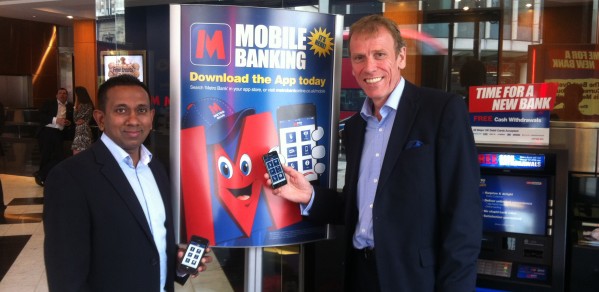
Date: 2025-10-16 Page is: DBtxt003.php txt00009152
Innovation
Mobile Banking ... Fintech Labs
Cambridge Alumnus Phil Sorrell helps revolutionise high street banking with mobile innovation
Burgess COMMENTARY
Peter Burgess
Cambridge Alumnus Phil Sorrell helps revolutionise high street banking with mobile innovation

IMAGE Phil Sorrell (right) with Fintech-labs colleague Parinda Kularatne (left)
On Friday 30 January Metro Bank opened its Cambridge store. Metro Bank is the first new high-street bank in the UK for over 100 years. For Cambridge Engineer, Phil Sorrell, this was also a significant landmark.
Over a decade earlier, Phil set up FE-Mobile and with colleagues created the world’s first highly secure downloadable mobile banking platform, a solution that is now being used by millions around the world. Metro Bank became the first UK bank to benefit from the smart apps advanced features – the first in the UK to enable the temporary blocking and un-blocking of payment cards direct from the mobile handset. Now these features are available to current students at the university.
Phil Sorrell graduated in 1981, the second year of what is now the MET Tripos – a course that fostered an entrepreneurial spirit from the outset. In early 2002 when the first mobile phones were launched that could download Java programs over-the-air, Phil and colleague Steve Limb had the vision that mobile phones could be used by the masses for making secure payments. Mobile phones have screens, keyboards and were always connected. With the right security, the mobile handset would become a mobile authentication device in one’s pocket that when connected to a source of funds – eg a wallet or bank account – could eventually obviate the need for ATMs and point of sale terminals. FE-Mobile created a highly scalable software platform that enabled secure banking and payment applications to be delivered over-the-air.
Phil initially took the FE-Mobile vision to financial institutions in the UK. However, this country was slow off the mark – banks were interested but none of the traditional players wanted to be first out of the blocks. Egg was the first UK visionary bank to take the product but its sale by Prudential in 2006 to Citigroup led to the cancellation of a number of part-implemented projects, including mobile banking. Phil recall’s this as one of the lowest points as the company was poised to launch its product with 300,000 customers. With a shift in strategy, Phil secured partnerships with banking software vendors Misys and Temenos who had thousands of banks as clients world-wide. The company proceeded to license its software to banks on other continents.
In Asia, organisations were keen to adopt new technology and were quick to link to utility companies for bill payments. In Africa, mobile money took off because users could often save half a day round-trip just to reach a bank branch – costly in time and money. In Latin America the drivers for adoption included personal security since it can be risky there to carry lots of cash. In all cases, rather than be followers, banks on other continents wanted to use mobile banking as a differentiator often requesting periods of exclusivity.
As the market around the world took off, Phil’s office became departure lounges at Heathrow and Gatwick. Additional features and channels were added to the product. Countries around the world that had been slow to embrace the internet, were able leap leapfrog technology as their customers move straight to the mobile channel. In 2010, as the demand for direct mobile channels accelerated and smart phones took off, FE-Mobile was acquired by one of its distribution partners, Temenos.
Phil ran mobile banking at Temenos for three years before starting his latest venture, Fintech-labs, founded with fellow colleague, Parinda Kularatne. Fintech-labs continues to work with Metro Bank as well as creating more innovations in the mobile arena. Of its latest products, Remote Deposit Capture (RDC) enables banks to process cheque images captured on smartphone cameras so cheques can be paid-in without visiting a branch – a key requirement for their customers in the North American market. In emerging markets this capability is used during the registration process for capturing photos, ID documents and signatures during customer onboarding as part of their Agent Banking module. Fintech-labs is also pioneering with its geo-fencing marketing platform. This application enables clients across many industries to interact more closely with their customers. When an opted-in consumer walks into a virtual geo-fence they can receive relevant notifications or offers. There are many new innovations to come.
Phil has always been an agent of change, previously leading customer-driven transformation programmes at board level in leading retailers. So the engagement at Metro Bank is a perfect cultural fit – with its early and late opening hours 362 days a year service ethos, it is far more retail focused than traditional banks.
Customer channel banking has come a long way. Phil’s contemporaries will remember banking in Cambridge during the early 80s when branches were closed all weekend and the ATMs of a certain bank during the anti-apartheid era were frequently superglued shut. Whilst Metro Bank opening in Christ’s Lane and offering mobile banking to current students maybe a significant personal milestone, Phil has other reasons to come back to Cambridge. Whilst he is pleased to see his metaphorical baby launching in Cambridge, one of his daughters is now reading history at Jesus College.
The text in this work is licensed under a Creative Commons Licence. If you use this content on your site please link back to this page. For image rights, please see the credits associated with each individual image.